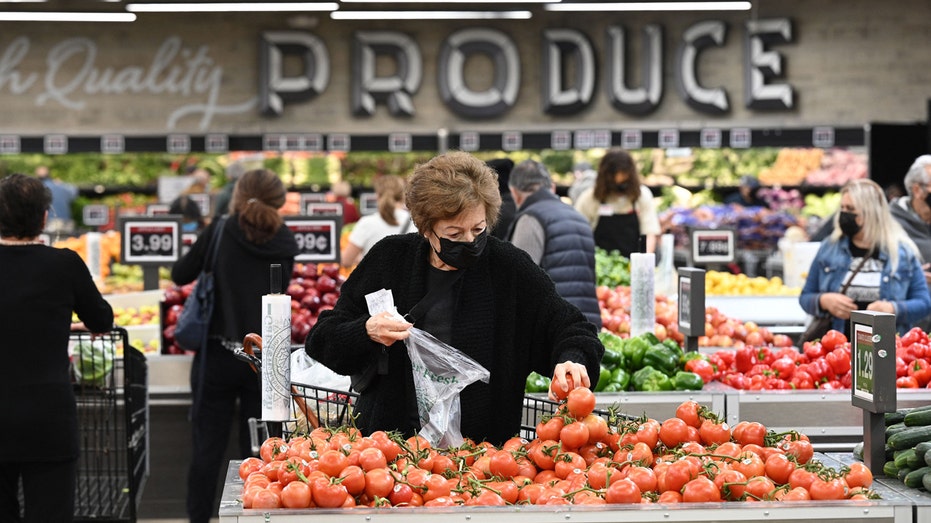Inflation accelerates 7.5% in January, hitting a fresh 40-year high
Red-hot inflation is eroding American's wage gains and hurting Democrats in an election year
U.S. inflation hits 40-year high after jumping 7.5 percent in January
U.S. inflation rose 7.5 percent in January, the highest since February 1982. FOX Business Ed Lawrence with more.
Inflation surged more than expected in January, notching another four-decade high as strong consumer demand and pandemic-related supply-chain snarls fueled rapid price gains that wiped out the benefits of rising wages for most Americans.
The consumer price index rose 7.5% in January from a year ago, according to a new Labor Department report released Thursday, marking the fastest increase since February 1982, when inflation hit 7.6%. The CPI – which measures a bevy of goods ranging from gasoline and health care to groceries and rents – jumped 0.6% in the one-month period from December.
Economists expected the index to show that prices surged 7.3% in January from the previous year and 0.5% on a monthly basis.
MOST SMALL BUSINESSES SINCE 1974 ARE HIKING PRICES TO OFFSET INFLATION
So-called core prices, which exclude more volatile measurements of food and energy, climbed 6% in January from the previous year – a sharp increase from December, when it rose 5.5%. It was the steepest 12-month increase since August 1982.
"U.S. annual CPI is the highest since 1982, and what’s worse is that this likely isn’t the peak," said Seema Shah, chief strategist at Principal Global Investors. "Higher-than-expected monthly gains in core CPI indicate continued underlying heat and will do nothing to relieve pressure on the Fed to tighten sharply and urgently."
Stocks declined after the report, with tech leading the broad market selloff.
Rising inflation is eating away at strong wage gains that American workers have seen in recent months: Real average hourly earnings rose just 0.1% in January from the previous month, as the 0.6% inflation increase eroded the 0.7% total wage gain, according to the Labor Department. On an annual basis, real earnings actually declined 1.7% in January.
Price increases were widespread: Although energy prices rose just 0.9% in January from the previous month, they're still up 27% from last year. Gasoline, on average, costs 40% than it did last year. Food prices have also climbed 7% higher over the year, while used car and truck prices – a major component of the inflation increase – are up 40.5%. Shelter costs jumped 0.3% for the month and 4% year-over-year.
The inflation spike has been bad news for President Biden, who has seen his approval rating tumble as consumer prices rise. The White House has blamed the price spike on supply-chain bottlenecks and other pandemic-induced disruptions in the economy, while Republicans have pinned it on the president's massive spending agenda and his energy policies targeting the oil and gas industries.

People shop for groceries at a supermarket in Glendale, California, on Jan. 12, 2022. (ROBYN BECK/AFP via Getty Images / AP Newsroom)
The eye-popping reading – which marked the eighth consecutive month the gauge has been above 5% – could also amp up pressure on the Federal Reserve to kick off its interest rate increases next month with a half-basis point hike. Raising interest rates tends to create higher rates on consumers and business loans, which slows the economy by forcing them to cut back on spending.
Traders are now pricing in over a 44% chance of a hefty half-point rate jump when policymakers meet next month, instead of a more modest quarter-point increase. It would mark the first time since 2000 that the U.S. central bank raised the federal fund rate by 50 basis points. The Fed has not raised rates since December 2018. The odds of a sixth quarter-basis point hike this year, meanwhile, jumped to 63% after the inflation report.
"At this point it’s not a question of will they, won’t they – it’s a question of how many hikes we’ll see in 2022, and what the magnitude and pace will be," said Mike Loewengart, managing director of investment strategy at E*Trade. "Given views on these aspects are all over the map at this point, there is a lot for the market to be uncertain about."
GET FOX BUSINESS ON THE GO BY CLICKING HERE
Fed Chairman Jerome Powell has left open the possibility of a rate hike at every meeting this year and has refused to rule out a more aggressive, half-percentage point rate hike, but said it's important to be "humble and nimble."
"We’re going to be led by the incoming data and the evolving outlook," he told reporters during the central bank's policy-setting meeting last month.





















